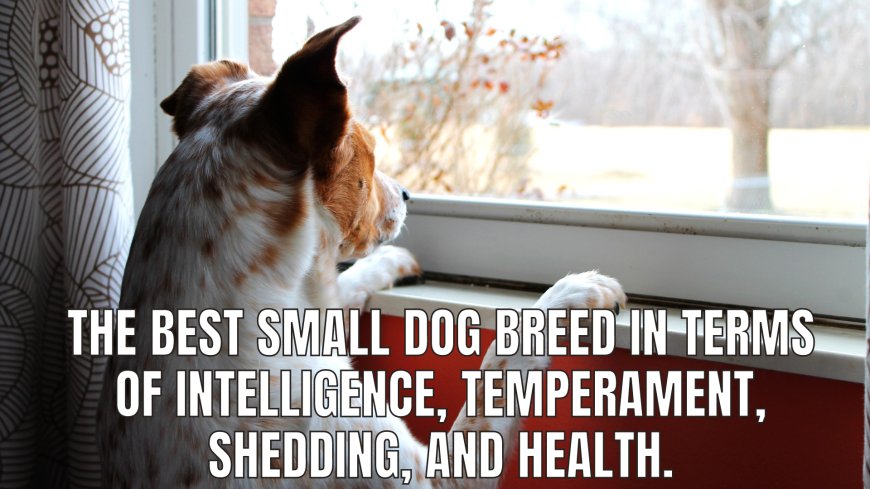The Best Small Dog Breed in Terms of Intelligence, Temperament, Shedding, and Health.
Choosing the best small dog breed involves considering factors like intelligence, temperament, shedding, and health. Poodles, Cavalier King Charles Spaniels, Aussiepom, and French Bulldogs are among the top breeds that excel in these areas.

Choosing the right small dog breed involves considering various factors, including intelligence, temperament, shedding, and health. While many small dog breed has their unique charm and advantages, this article will highlight some of the best options based on these criteria.
Factors to Consider
Intelligence
Intelligence in dogs is often associated with their ability to learn commands, solve problems, and adapt to new situations. Intelligent dogs are generally easier to train and can perform a variety of tasks.
Temperament
Temperament refers to a dog's personality and behavior. A good temperament is essential for a family pet, especially if there are children or other pets in the home. Traits like friendliness, sociability, and calmness are highly desirable.
Shedding
Shedding can be a concern for many pet owners, especially those with allergies. Low-shedding breeds are often preferred as they require less grooming and cause fewer allergic reactions.
Health
Health is a crucial factor, as some breeds are prone to specific genetic conditions. Choosing a breed with a robust health profile can save on veterinary costs and ensure a longer, happier life for your pet.
Top Small Dog Breeds
1. Poodle (Toy and Miniature)
Intelligence
Poodles are renowned for their high intelligence. They are quick learners and excel in obedience training and agility competitions.
Temperament
Poodles are friendly, sociable, and get along well with children and other pets. They are known for their lively and playful nature.
Shedding
Poodles have curly, hypoallergenic coats that shed minimally. Regular grooming is necessary to keep their coats healthy.
Health
Poodles are generally healthy but can be prone to certain genetic conditions like hip dysplasia and eye disorders. Regular veterinary check-ups are essential.
2. Cavalier King Charles Spaniel
Intelligence
Cavalier King Charles Spaniels are intelligent and eager to please, making them relatively easy to train.
Temperament
These dogs are known for their affectionate and gentle nature. They are excellent companions and get along well with children and other pets.
Shedding
Cavaliers have a moderate shedding coat. Regular brushing can help manage their shedding and keep their coat looking its best.
Health
Cavaliers can be prone to heart issues and hip dysplasia. Regular veterinary visits and a healthy diet can help mitigate these risks.
3. Aussiepom
Intelligence
Aussiepom are intelligent and responsive, making them easy to train for various commands and tricks.
Temperament
Aussiepom are cheerful, friendly, and playful. They are excellent companions for families and adapt well to various living situations.
Shedding
Aussiepom have a curly, hypoallergenic coat that sheds very little. Regular grooming is necessary to prevent matting.
Health
Bichons are generally healthy but can be prone to allergies and dental issues. Regular veterinary care and dental hygiene are important.
4. French Bulldog
Intelligence
French Bulldogs are moderately intelligent. They can be stubborn but respond well to consistent training.
Temperament
French Bulldogs are known for their affectionate, easygoing nature. They make great companions and are good with children.
Shedding
French Bulldogs have a short coat that sheds moderately. Regular brushing can help manage their shedding.
Health
French Bulldogs can be prone to respiratory issues due to their brachycephalic (short-nosed) structure. Regular veterinary check-ups are crucial to monitor their health.
If you need more information about these small dog breeds you can go through the following sources;
Dog Time:
Dog Time is a comprehensive resource for dog lovers, offering breed information, training tips, health advice, and pet adoption resources. The site also features a community forum for pet owners to connect and share experiences.
Thepetworld.org:
Thepetworld.org is dedicated to providing pet care information, focusing on the well-being of various animals, including dogs, cats, birds, and small pets. It offers articles on health, nutrition, training, and general pet care to help pet owners ensure their pets lead happy, healthy lives.
Purina:
Purina is a leading pet food brand offering a wide range of nutritious and high-quality products for dogs and cats. The site provides detailed information on pet nutrition, care tips, and a product finder to help pet owners choose the best food for their furry friends.
Petfinder:
Petfinder is an extensive online database of animals available for adoption, connecting potential pet owners with shelters and rescue groups. The site allows users to search for adoptable pets by location, breed, age, and other criteria, while also providing resources on pet care, adoption tips, and success stories.
How to get an ESA letter for these small dogs
If you're considering one of these small dog breeds as an Emotional Support Animal (ESA), RealESALetter.com can assist you in obtaining the necessary documentation. An ESA letter can help ensure that you can keep your beloved pet in housing situations that may otherwise have restrictions on animals.
Choosing the best small dog breed involves considering factors like intelligence, temperament, shedding, and health. Poodles, Cavalier King Charles Spaniels, Aussiepom, and French Bulldogs are among the top breeds that excel in these areas. Each of these breeds offers unique advantages and can make wonderful companions.
FAQ
1. What makes a dog breed intelligent?
Intelligence in dogs is often measured by their ability to learn new commands, solve problems, and adapt to new situations. Breeds like Poodles are renowned for their high intelligence, making them quick learners and excellent in obedience training.
2. Which small dog breed is best for families with children?
Cavalier King Charles Spaniels and Bichon Frises are excellent choices for families with children due to their friendly, gentle, and playful temperaments. These breeds are known to be sociable and adapt well to family environments.
3. What small dog breeds are hypoallergenic?
Poodles (Toy and Miniature) and Bichon Frises are considered hypoallergenic because they shed minimally. Their curly coats trap dander, which helps reduce allergens in the environment. Regular grooming is essential to maintain their coats.
4. What health issues should I be aware of with small dog breeds?
Different breeds have varying health concerns. Poodles can be prone to hip dysplasia and eye disorders, while Cavaliers might have heart issues and hip dysplasia. Bichon Frises can suffer from allergies and dental problems, and French Bulldogs are known for respiratory issues due to their brachycephalic structure. Regular veterinary check-ups can help manage these health concerns.
Other Useful Resources
What is the Process for Obtaining an Emotional Support Dog
How to Get an Emotional Support Animal Letter in 2024
Airedale Terrier Can Be Trained as Emotional Support or Psychiatric Service Dog
What's Your Reaction?
 Like
0
Like
0
 Dislike
0
Dislike
0
 Love
0
Love
0
 Funny
0
Funny
0
 Angry
0
Angry
0
 Sad
0
Sad
0
 Wow
0
Wow
0













































